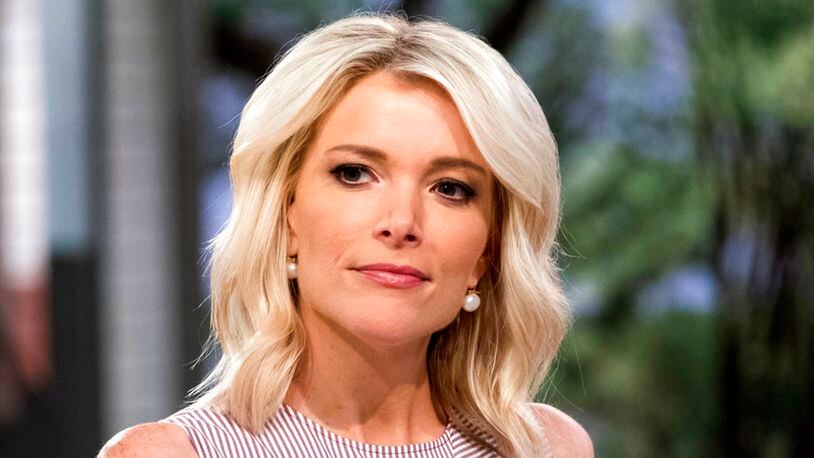“I want to begin with two words: I'm sorry,” Kelly said, going on to reference her defense of blackface on her show Tuesday.
“The country feels so divided and I have no wish to add to that pain and offense. I believe this is a time for more understanding, more love, more sensitivity and honor.”
Before Kelly's show, some of her "Today" colleagues discussed her comments.
“This is a history going back to the 1830s -- minstrel shows -- to demean and denigrate a race wasn’t right,” Al Roker said. ““I’m old enough to have lived through ‘Amos ‘n’ Andy,’ where you had white people in blackface playing two black characters just magnifying the worst stereotypes about black people. And that’s what the big problem is and that’s what the issue is.”
Co-host Craig Melvin responded to claims by some that criticism of blackface is “political correctness run amok.”
“That’s silly, and it’s disingenuous, and it’s just as ignorant and racist as the statement itself,” Melvin said.
Watch Kelly's full apology below.
Megyn Kelly made headlines Tuesday for comments she made on her NBC show "Megyn Kelly Today" about wearing blackface for Halloween.
During a panel discussion on her show, the journalist discussed costumes for the holiday, specifically highlighting the controversy around blackface.
Kelly questioned the protests about wearing blackface.
“What is racist? Because you do get in trouble if you are a white person who puts on blackface on Halloween, or a black person that puts on whiteface for Halloween,” she said. “And back when I was a kid, that was OK, as long as you were dressing up as, like, a character.”
Megyn Kelly wonders what the big deal is about blackface pic.twitter.com/07yvYDuAYe
— Tommy Christopher (@tommyxtopher) October 23, 2018
Blackface's origins can be traced to minstrel shows from the 19th century, where white actors used black grease paint on their faces to depict and mock plantation slaves and free blacks on stage. In recent years, the issue has resurfaced and made headlines in cases where white people − from college students to celebrities − have emulated black actors, singers and athletes by using makeup to appear darker.
During Kelly’s panel discussion Tuesday, she brought up one such instance of that, referencing a scene from “The Real Housewives of New York,” where one of the white castmates, Luann de Lesseps, dressed up as Diana Ross by applying darker make-up and sporting an afro wig.
“There was a controversy on 'The Real Housewives of New York' with Luann (de Lesseps). She dressed as Diana Ross, and she made her skin look darker than it really is. And people said that that was racist. And I don’t know,” she continued. “I thought like, who doesn’t love Diana Ross? She wants to look like Diana Ross for one day, and I don’t know how that got racist on Halloween.”
>> On AJC.com: Why do white people keep dressing in blackface?
Soon after the segment aired, folks on social media sent a barrage of tweets condemning her. Many disagreed with her remarks about blackface being OK when they were children.
Dear @megynkelly — you and I are approximately the same age. Blackface was NOT okay when we were kids. Take it from a big-hearted boy who just wanted to show his love for Nipsey Russell on the worst Halloween of my life. https://t.co/pnsk0WmuTw
— Patton Oswalt (@pattonoswalt) October 23, 2018
I was born in the same decade as @megynkelly and do not recall blackface being acceptable anywhere, anytime. https://t.co/uN061Uo9cS
— Alex Wagner (@alexwagner) October 23, 2018
I'm older than Megyn Kelly. And no, when we were kids, it was definitely NOT OKAY for white kids to put on blackface, because even then we knew about the deep historical racism of blackface.
— Lisa Bloom (@LisaBloom) October 23, 2018
Appalling then, appalling now. https://t.co/ZDr7Qhrxwo
Others called her opinions problematic, stating she was “ignorant” and “racist.”
Megyn Kelly was the victim of awful sexist attacks by Donald Trump. Megyn Kelly is also a dishonest and racist person who should never have been hired by NBC. Both these things are simultaneously true.
— Palmer Report (@PalmerReport) October 23, 2018
Is she, @megynkelly really this ignorant to think Black Face is okay at anytime? Too much on too many different levels here to unpack. Black Face for Halloween or anyday, NO! https://t.co/4L3HM7y2Zz
— AprilDRyan (@AprilDRyan) October 23, 2018
white parents, teach your children about institutionalized racism so they don't grow up to be Megyn Kelly
— Jeff Tiedrich (@itsJeffTiedrich) October 23, 2018
And a few attempted to school her on the history of blackface and how to portray African-American figures without darkening their skin.
Hey @megynkelly. This is where having a Black person on your panel today would have helped you. We could have explained to you and your audience the history of blackface and why it matters. Go watch Spike Lee’s “Bamboozled.” IT’S AMERICAN HISTORY. #BlackVoicesMatter
— rolandsmartin (@rolandsmartin) October 23, 2018
Somebody tell Megyn Kelly it's TOTALLY possible to portray a Black character/person without donning Blackface.
— Britni Danielle (@BritniDWrites) October 23, 2018
Exhibit A, B, and C pic.twitter.com/BDf7Eu1gFj
>> On AJC.com: White blogger creates 'chocolate challenge' that some say is blackface
Amid the backlash, Kelly issued an apology by sending an internal email to her colleagues and friends.
“One of the wonderful things about my job is that I get the chance to express and hear a lot of opinions. Today is one of those days where listening carefully to other points of view, including from friends and colleagues, is leading me to rethink my own views,” she wrote. “I realize now that such behavior is indeed wrong, and I am sorry. The history of blackface in our culture is abhorrent; the wounds too deep.”
Here's the email Megyn Kelly sent to colleagues today apologizing for her comments on blackface Halloween costumes pic.twitter.com/cOVW1QWJB6
— Tom Kludt (@TomKludt) October 23, 2018
About the Author
